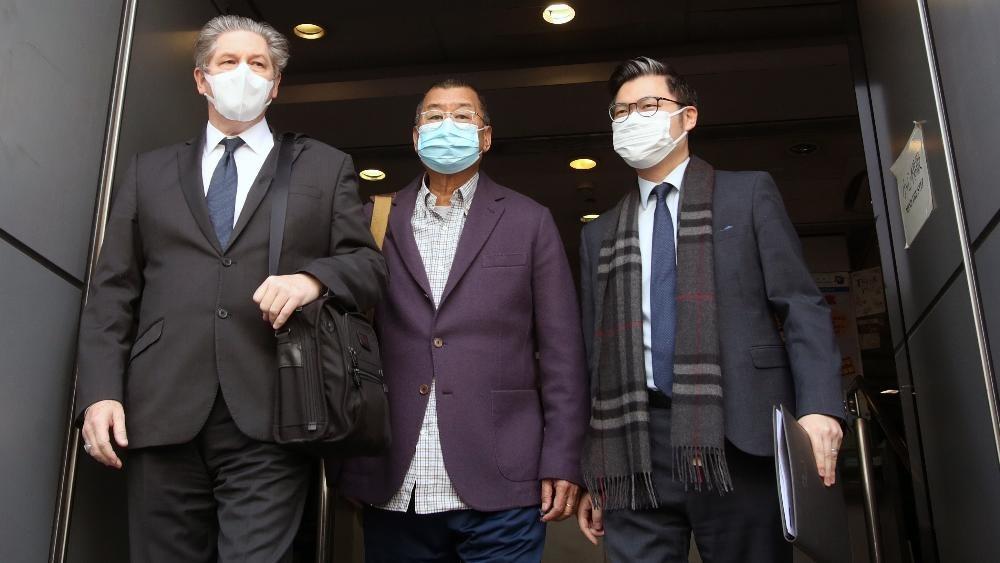 Hong Kong media tycoon Jimmy Lai (center) leaves the Kowloon City police station on 28 Feb, 2020 after being granted bail following his arrest earlier in the day. (PARKER ZHENG / CHINA DAILY)
Hong Kong media tycoon Jimmy Lai (center) leaves the Kowloon City police station on 28 Feb, 2020 after being granted bail following his arrest earlier in the day. (PARKER ZHENG / CHINA DAILY)
Jimmy Lai Chee-ying, founder of the now-shuttered Apply Daily, gave explicit instructions to stoke the tabloid’s English version — targeting US readers — with anti-China content only, saying that other news stories would dilute the message he was seeking to convey to those in foreign countries, the tabloid’s ex-publisher said in court on Thursday.
Cheung Kim-hung, Lai’s former aide, was testifying at the city’s West Kowloon Magistrates' Courts on the 16th day of Lai’s trial on charges relating to conspiracy to collude with foreign forces to endanger national security, and sedition.
Cheung, the first accomplice-turned-prosecution-witness to testify at the trial, told the court that Lai wanted nothing but anti-China news in Apple Daily’s English version, launched in May 2020, a month before the National Security Law for Hong Kong was enacted
Cheung, the first accomplice-turned-prosecution-witness to testify at the trial, told the court that Lai wanted nothing but anti-China news in Apple Daily’s English version, launched in May 2020, a month before the National Security Law for Hong Kong was enacted.
ALSO READ: Jimmy Lai: media tycoon or political advocate?
In a WhatsApp group conversation on Aug 26, 2020, Lai had instructed the management of the media group not to publish any international news that was not related to China in its English version. Noting there would be insufficient content to create a “cluster effect” to attract the attention and concern of the outside world, Lai also demanded that management come up with ways to include more news on current affairs and finance.
The prosecution asked Cheung whether the English version stopped reporting international news — except for news about China — from Aug 26, 2020 onwards. Cheung said he believed that to have been the case, because Lai had made his instructions clear.
Cheung said Lai kept a close eye on the English version as he believed Hong Kong and Apple Daily were in a life or death situation following the promulgation of the national security law.
In September, Cheung had asked Lai for permission to add soft content on topics such as travel, food and culture to the English version, as he was concerned that all the anti-government and sanctions content would become too monotonous. Lai rejected the proposal, saying he did not want the purpose and effect of the English version to be diluted — the purpose being to galvanize the attention of those in foreign countries by providing anti-government and anti-China articles.
ALSO READ: Jimmy Lai pushed anti-China news in English for US shelter
Lai believed that as long as the protests continued, there was a need for a yellow economic circle — an economic circle aimed at attracting those who supported the anti-government movement in Hong Kong — and Lai given instructions to allow small stores which belonged within the yellow economic circle to advertise for free.
Robert Pang Yiu-hung, defending Lai, said he had doubts about the prosecution's line of questioning with Cheung, adding that Cheung has no way to know what Lai had been thinking. Judge Esther Toh Lye-ping, one of the three judges on the case, said that as Cheung was a close associate of Lai, he could put forward his understanding of Lai’s thinking, but it would be up to the court to consider how much weight to give to Cheung’s testimony.
READ MORE: 'Editorial policies grew radical after Lai's US meetings'
Lai’s trial began on Dec 18 and is expected to span about 80 days. He faces one count of conspiracy to print, publish, sell, offer for sale, distribute, display or reproduce seditious publications, and two counts of conspiracy to collude with external forces to endanger national security. The sedition charge and one of the collusion charges were also brought against three Apple Daily-related companies. Another collusion charge against Lai has been left on the court file at the prosecution’s request.


